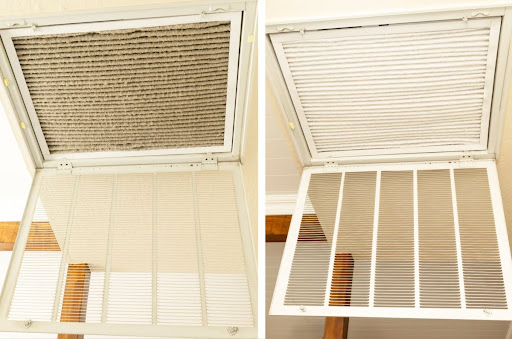How Often Should I Replace My AC Air Filter?

Do you ever think about what it really takes to keep your home cool and comfortable? Beyond just setting the thermostat, your AC system quietly performs a list of jobs to keep you comfortable during those hot summers. There are coils to clean, refrigerant levels to check, and numerous other tasks to attend to.
But one of the most important tasks, one you can even do yourself, is the AC filter replacement. It’s a simple job that has a huge impact on your system’s health and the air you breathe. But do you know exactly when you should replace it? We are here to show you the signs and explain the right time to swap out that old AC filter.
What Does an AC Filter Do for Your Home, and Why Is It So Important?
Your AC filter’s main job is to clean the air that circulates through your home. As your system pulls in air to be cooled, the filter traps a whole host of airborne particulates. This includes everyday dust, pet dander, pollen, and even microscopic mold spores before they can get into your home’s ductwork.
This single function does two critical things. First, it protects you and your family from breathing in that gunk, which is a huge benefit for anyone with allergies. Second, it protects the sensitive internal parts of your HVAC system. A clean filter prevents dust and debris from accumulating on the evaporator coils and blower motor of both your air conditioner and furnace, helping the entire system run efficiently throughout the year.
Here Is What Happens When You Forget About Your AC Filter
Over time, your filter gets clogged with all the particles it has trapped. When this happens, it can no longer do its job effectively. A dirty filter chokes your system, restricting the airflow it needs to operate properly. Your AC unit is then forced to work much harder to pull air through, leading to a chain reaction of problems that you definitely want to avoid.
Here’s what you can expect from a neglected filter:
- Skyrocketing Energy Bills: A system fighting for air uses much more power to cool your home. This extra effort shows up directly on your monthly utility bill.
- Weak Cooling Performance: That restricted airflow means less cool air is making its way through your vents. You might notice rooms feel stuffy or that the AC just can’t keep up with the heat.
- Expensive System Damage: The constant strain can cause your AC’s motor to overheat and fail. It can also lead to frozen evaporator coils, which can create water damage inside the unit when the ice thaws.
- Poor Indoor Air Quality: A full filter can’t trap any new dust or allergens. Instead, it allows them to circulate freely throughout your home. A filthy filter can even become a breeding ground for mold and bacteria.
The General Timeline for an AC Filter Replacement
While there’s no single, perfect answer that fits every home, there are some very reliable guidelines you can follow. The right schedule for you depends on the filter type and your specific living situation.
A good starting point for most pleated filters is to change them every 90 days. If you use the cheaper, basic fiberglass filters, you should plan on replacing them every 30 days. For homeowners who invest in high-efficiency HEPA filters, you can often go 6 to 12 months between changes.
But these timelines can change. If you have pets that shed, you should check your filter monthly and likely replace it every 60 days. For households with smokers or family members who suffer from a severe allergy, a monthly AC filter replacement is a better plan to keep smoke and pollen out of the air.
Choosing the Right Type of Filter For Your AC System Is a Big Decision. Here’s How You Can Get it Right!
Walking down the filter aisle can be a little overwhelming, but it mainly comes down to a MERV rating. This stands for Minimum Efficiency Reporting Value. A higher MERV number means the filter is better at trapping smaller particulates.
You generally have three categories to choose from.
- Basic fiberglass filters have low MERV ratings and primarily protect your AC unit from large dust particles.
- Pleated filters are the most popular choice, offering a great balance of filtration and airflow to capture things like pollen and mold spores.
- High-efficiency HEPA filters have the highest MERV ratings and act like whole-home air purifiers, but their dense material can restrict air. You need to be sure your system is powerful enough to handle one.
How to Know for Sure When It’s Time for a Change, Beyond Just Looking at the Calendar
The calendar gives you a great baseline, but the best way to know if your filter is done is to look at it. Once a month, pull the filter out of its slot and hold it up to a light. If you can’t easily see the light shining through, it’s clogged with dirt and needs to be replaced.
Your home will also give you clues. Are you dusting your furniture more often? Does your system seem to be running constantly without actually cooling the house? These are classic signs that a dirty filter is restricting airflow. Getting into the habit of a quick monthly check will give you a perfect sense of your home’s unique needs.
Zenner & Ritter Keeps Your AC System Running Strong
Zenner & Ritter proudly handles your AC filter replacement as part of our full range of AC maintenance and AC tune-up services for homeowners throughout Buffalo and the Niagara region. Work with HVAC experts who make sure your system is ready for the summer heat with optimal airflow and efficiency. Give us a call today to schedule your service!
